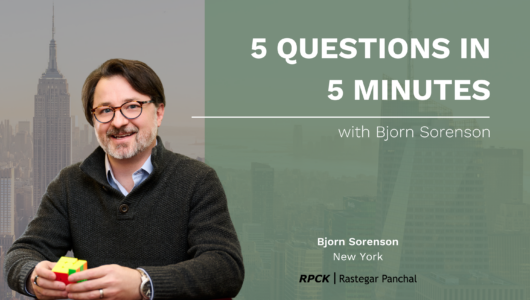Like most attorneys at RPCK, you have a rich professional background — can you share a bit about how you became interested in law and, more specifically, impact law?
Law is a second career for me. I originally thought I wanted to do a Ph.D. in religion and conflict resolution. I got a master’s degree at Harvard Divinity School and taught a foreign study program for several years. Through that international experience, I became more interested in human rights and development work—specifically the structural roots of poverty and violence. That’s what took me to law school.
Like nearly all of my colleagues at RPCK, I got my legal formation at a large, global law firm. I worked in the New York and Singapore offices of Skadden Arps. While at Skadden, I did a lot of pro bono work for a group called the Public International Law & Policy Group, which focused on human rights and development consulting. This pro bono work offered a greater connection to the outcomes of the work I was supporting—very different from the same old loan documentation and generic financings, which was quickly losing its appeal for me.
One of our pro bono clients at Skadden was Grameen America, which is the US operation of the Nobel Prize-winning microfinance Grameen Bank founded by Muhammad Yunus. I had done some work for them because they are a debt-in debt-out organization. They aggregate investments and then make microfinance loans in the United States. My main legal practice is debt-leveraged finance, so it was an ideal fit for me there.
I was also looking for something that was more aligned with my personal interests. So, when the opportunity came and they asked me to be General Counsel, I happily accepted. That was my path from law firm to in-house counsel of an impact organization.
Can you talk about how your career has evolved alongside impact investing?
This is really interesting because a generation of us — and this includes a number of my RPCK colleagues — grew up practicing law before impact investing was a thing. The term “impact investing” only became popular in the 2010s — and this is when I was already several years deep into my legal practice at Skadden Arps.
Around the time I was at Grameen, I connected with many people in the Impact Investing Legal Working Group (IILWG), some of whom would eventually become my colleagues at RPCK. This era marked the emergence of an established impact investing legal space and a dedicated network of lawyers building a mission-aligned intentional community focused on questions like, “What is impact investing law?” and “How can we support each other?”
How did your passion for impact investing law lead you to RPCK?
The impact investing legal community is a remarkably small world. I met RPCK Founding Partner Chintan Panchal years ago at one of the IILWG/Grunin conferences and we had some great conversations. At that time, I was engaged Blue Dot Advocates on legal work and doing independent executive coaching and mission-aligned consulting in the impact space. Chintan and I stayed in touch over the years, and when an opportunity surfaced to support RPCK’s growing debt practice, Chintan reached out.
I joined RPCK because we are indisputably the leading boutique law firm in the impact investing field. Why wouldn’t I want to be aligned with that? Dream job.
Can you tell us about the work that you do now?
I lead the debt practice at RPCK, and I maintain a small executive coaching practice. I regularly provide workshops and coaching around well-being in the legal community. Lawyers have some of the highest incidence of stress, burnout, and addiction across all sectors. As you know, there is not much societal sympathy for the suffering lawyer, so we need to build support from inside the profession. Working with RPCK allows me to do legal work that I really enjoy and contribute broadly to the legal community. I’m grateful for RPCK’s flexibility.
Specifically, in my role as a debt lawyer, I advise borrowers and lenders on leveraged finance and secured transactions and serve clients in a general advisory and outside general counsel role. The practice includes support for Community Development Financial Institutions, collaboration with my colleagues across practice groups, and development of more innovative structures such as revenue-based financing.
What are some things you love about working at RPCK?
I genuinely like everyone I work with, which is such a blessing. In addition to colleagues, my clients are also lovely people. The work our clients do, and the work we do with our clients and community is amazing. There’s a quality to the culture that we’re all engaged with—working together to close the gap between the world that we have and the world that we want to see.

